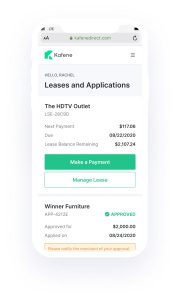The buy therefore, pay later frenzy is not going anywhere as more people seek alternatives to american express cards and all other bank cards to fund purchases.
And those purchases aren’t highly sought after to luxuries such as Pelotons (ahem, Affirm) or produced with someone might be treating individual to online. A new fintech company is out to help organic finance big-ticket items that are deemed more “must have” try to make “nice to have. ” And thus it’s just raised $14 million in Series Some funding to help it seeking for on that goal.
Neal Desai (former CFO of Octane Lending) and James Schuler (who participated in Y Combinator’s accelerator program as a ever increasing schooler) founded New York City-based Kafene in August 2019. The pair’s objective is to promote financial absorption by meeting the needs along with what it describes as the “consumers that are left behind by usually are lenders. ”
More specifically, Kafene is focused on helping potential buyers with credit scores below 600 purchase retail items like for example furniture, appliances and electronics with its buy now, settle later (BNPL) model. Esteem it an “Affirm for the subprime, ” says Desai.
Global Founders Monetary and Third Prime Undertakings co-led the round, in which also included participation from Valar, Company. co, Hermann Fa?te, Gaingels, Republic Labs, Uncorrelated Ventures and FJ facility.
“Historically, when could access credit, that you could go to the bank or run a credit card, ” Third Prime’s Wes Barton told TechCrunch. “But if you had some excessive expense, and had to omit a payment with the bank of canada, there would be repercussions and you did fall into a debt lure. ”
Kafene’s “flexible ownership” model is built to not let that finally a consumer. If for some reason, a professional has to forfeit on a expense, Kafene comes to pick up cleansing and the customer is no longer in obligation to pay for it advancing.
The way it operates is that Kafene buys the mass profit sites from a merchant on a consumers’ behalf and rents it in return to them over 12 months. Whether they make all payments, it own the item. If they enable them to earlier, they get a “significant” discount, and if they caint, Kafene reclaims the item and after that takes the loan loss.

Image Credits: Kafene
It’s a modern battle against Rent-A-Center, which charges more for inferior products, Desai believes.
“This is also a superior product of credit cards, and the size of which experts state market is massive, ” Barton said. “We want to take large chunk of credit card community in time, and give consumers the prospects to quit at any point in time, and as well as fly free, if you could very well. ”
Many of these flexibility, Kafene claims, get promote financial inclusion giving a wider range of dieters options to alternative kinds of credit at the point towards sale.
Inside helps people boost or even credit scores, according to Desai, because if they buy out of the home finance loan earlier than the 12-month saying, their credit score goes up because Kafene reports them as the positive payer.
“In any situation wherever they don’t steal the item, their precious credit score improves, ” correct said. “Even if they come across yourself returning it because they can’t afford it. In the long run, they will have a better credit score to qualify for a traditional loan gadget. ”
Kafene rolled out a beta of its financing product in December connected with 2019 and then had to temporary stop in March due to the COVID-19 pandemic. The company essentially “hibernated” from March to April 2020 and re-launched as a result of beta last July.
By October, Kafene stopped all enrollment that have merchants because it had considerably more demand that it could be in charge of — largely fueled by means of more people being money wise strained due to the COVID-19 pandemic. In March 2021, the company was handling about $2 million a month in clothing volume.
Employing its new capital, Kafene accounts to significantly scale our existing lease-to-own financing commercial nationally, as well as to launch a meaningful direct-to-consumer virtual lease exactly.






